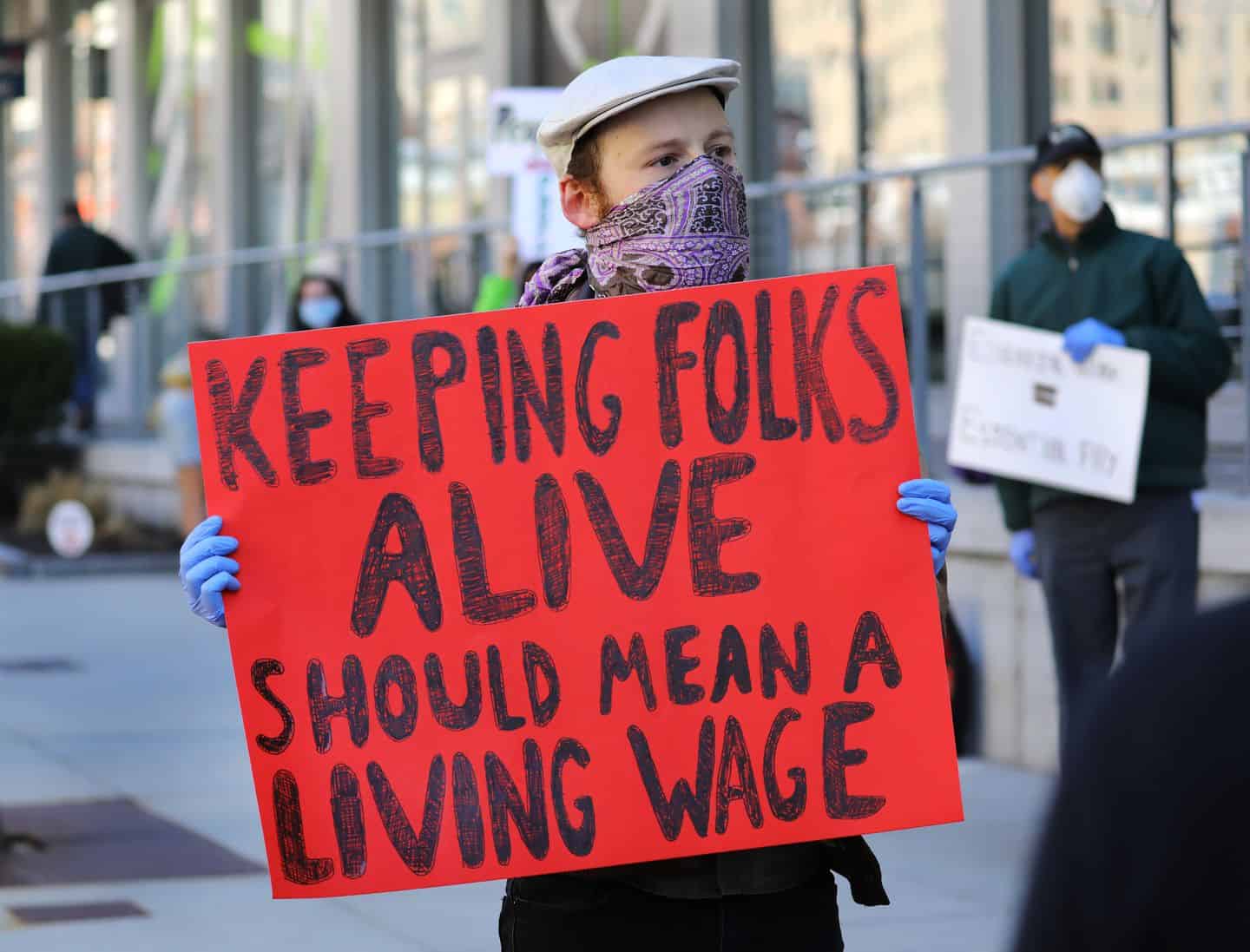
Minnie Che is a student at Harvard Law School.
Municipalities are pressuring supermarkets and grocery chains to raise hazard pay for frontline essential workers. Cities, including Seattle, WA and Long Beach, CA, have passed new rules mandating supermarkets to provide their employees temporary bonus pay. Los Angeles is considering a similar law that is designed to assist employees in public-facing roles, such as cashiers and baggers, that expose them to a higher risk of covid. Certain grocery chains are resisting the change, reasoning that the additional costs will be passed off to customers. Indeed, the CEO of California chain Gelson’s Markets has already raised prices for thousands of products after the rule went into effect in Long Beach. Kroger Co. has stated that it may close stores in areas with the new wage mandates, a move that union officials call “political posturing.” Others have considered cutting back on checkout services or change operating hours. But city and labor unions say that the supermarkets are making enough profit to fairly compensate their employees for their higher work load and greater risk during the pandemic. Grocery chains reported a 42% increase in profits during the first 3 quarters of 2020. Supermarket trade groups and grocer associations have filed lawsuits opposing the rules in court.
Animators working for Japanese anime shows, a $24 billion industry, are reporting minimum take-home pay for grueling animation and piecework, despite an increasingly profitable industry growth. The pandemic has escalated demand for video streaming of anime shows, yet thousands of illustrators take home as little as $200 a month. The increased demand has only widened the gap between profits and wages. In Japan, where hospitalization due to overworking is seen has honorable, illustrators are facing terrible working conditions in addition to low wages. While normally industry growth would create more competition for talent, thereby driving up pay for all, the problem stems from the business’s highest earners. Top of the line talent makes about $36,000, which places an earning ceiling on other lower-tiered animators. In the United States, as a comparison, animators earn on average $75,000, with high-level talent easily taking home six figures. Rather than negotiate higher pay, studios prefer to hire illustrators as freelancers to lower production costs. While working conditions seem to violate Japanese labor law, authorities have not taken enforcement seriously. Netflix has announced that it will team up with a studio to provide training and financial support to young animators. But for other studios, workers are still struggling to make ends meet as they continue pursuing their passion in animation.
A federal judge in California has denied an injunction from cable and wireless companies that challenged California’s net neutrality law, which has been in place for two years. This decision from U.S. District Court Judge John Mendez will open the door for California to enforce its consumer protection law. The law’s protection of net neutrality, the idea that the telecommunications industry should treat all online content with consistent standards, prevents cable and wireless companies from discriminating against digital content. The law also prohibits the practice of “zero rating,” which is where companies provide free data to some sources while billing others. Petitioners argued that the rules are unnecessary and interfere with reasonable business practices. The Trump administration sued to block the rule, but the Justice Department under President Biden’s administration dropped its challenge to the law in early February. State Sen. Scott Wiener, who authored the law, praised the decision as support for “the strongest net neutrality law in the nation.”
With two new legislations recently signed into law, the Labor Department’s Occupational Safety and Health Administration now has expanded reach to investigate complaints from whistleblowers facing retaliation. The Anti-Money Laundering Act established a whistleblower award program to incentivize the reporting of violations under the Bank Secrecy Act. The rule also protects whistleblowers against employer retaliation, which includes demotion, suspension, and blacklisting. The Criminal Antitrust Anti-Retaliation Act prohibits employer retaliation against those who report criminal antitrust violations, which includes discharging, demotion, suspension, harassment or other discrimination. The expansion of whistleblower protections allows OSHA to double down on its anti-relation enforcement efforts, and companies are forced to pay closer attention to their compliance under these new rules.
One of the big labor stories that OnLabor has been reporting on is the Democrats’ push for a $15 minimum wage by 2025, which is included in President Biden’s relief package. Senate parliamentarian Elizabeth MacDonough met with staff for Senate Democrats and Republicans Wednesday morning to discuss the proposal and hear arguments from both sides. A decision as on the reconciliation process is expected today. If the Democrats receive a favorable ruling on reconciliation, lawmakers could increase the federal minimum wage for the first time since 2009. But Democrats would still need to secure the required 50 votes. The proposed minimum wage increase is part of a covid-19 relief bill expected to be passed before federal unemployment programs expire mid-March. The $1.9 trillion package would also provide $1,400 in stimulus checks to many Americans while extending federal unemployment assistance. If MacDonough reaches the conclusion that the Senate will be unable to increase the minimum wage through the reconciliation process, the provision would either need to be removed from the bill or else require 60 votes in the Senate. Sen. Josh Hawley has proposed an alternative to the wage increase: a three-year program, funded by taxpayer dollars, where those making below $16.50 per hour would receive a refundable tax credit worth 50% of the difference.





Daily News & Commentary
Start your day with our roundup of the latest labor developments. See all
April 19
Alabama and Louisiana advance anti-worker legislation; Mercedes workers in Alabama set election date; VW Chattanooga election concludes today.
April 18
Disneyland performers file petition for unionization and union elections begin at Volkswagen plant in Tennessee.
April 18
In today’s Tech@Work, a regulation-of-algorithms-in-hiring blitz: Mass. AG issues advisory clarifying how state laws apply to AI decisionmaking tools; and British union TUC launches campaign for new law to regulate the use of AI at work.
April 17
Southern governors oppose UAW organizing in their states; Florida bans local heat protections for workers; Google employees occupy company offices to protest contracts with the Israeli government
April 16
EEOC publishes final regulation implementing the Pregnant Workers Fairness Act, Volkswagen workers in Tennessee gear up for a union election, and the First Circuit revives the Whole Foods case over BLM masks.
April 15
The Supreme Court ruled in favor of bakery delivery drivers in an exemption from mandatory arbitration case; A Teamsters Local ends its 18-month strike by accepting settlement payments and agreeing to dissolve